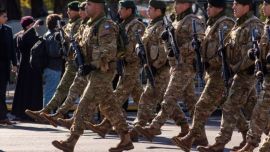Consumer prices in Argentina increased by 1.5 percent in May in relation to April amid a slowdown in the activity generated by the coronavirus pandemic, the INDEC national statistics bureau revealed Thursday.
The figure was slightly higher than economists’ forecasts of 1.4 percent, but nevertheless is around half of the monthly figures posted before the global crisis. The data means that inflation over the last 12 months in the country has totalled 43.4 percent, with a rise of 11.1 percent recorded in the first five months of 2020 so far.
The highest increases were registered in the clothing and footwear sector (7.5 percent), followed by household equipment (2.5 percent). Food and non-alcoholic beverages rose 0.7 percent, according to Indec, after rising the most last month (3.2 percent). Consumer price rises in utilities were also less than one percent.
May’s figure, at first glance, is somewhat misleading – price rises have slowed thanks to the mandatory nationwide lockdown imposed on March 20 to prevent the circulation of the novel Covid-19 coronavirus. That meant most people remained in their homes, spending les than usual.
Restrictions have been eased in some provinces, but they remain strict in Buenos Aires City and Province, where the overwhelming majority of infections have been registered.
Many experts have warned that inflation may soar in the near future, given that the Central Bank is printing money to cover the costs of the government’s fiscal stimulus measures introduced amid the pandemic.
From April to the end of June, the Government says it will have injected 1.7 trillion pesos (US$24.5 billion) into the economy, doubling the amount of money in the financial system.
The Central Bank’s most recent survey of economists shows that analysts foresee a rise of four percent inflation by October, with prices soaring by 51 percent in the coming 12 months.
Inflation in Argentina in 2019 reached 53.8 percent – one of the highest rates in the world. The country has been gripped by recession for two years. GDP slumped by 2.1 percent this year and most private estimates expect the economy to contract by more than seven percent this year, thanks to the coronavirus pandemic.
Before the global crisis, most banks and consultancy firms predicted inflation would hit 40 percent this year, with a 1.2 percent drop in GDP expected.
– TIMES/AFP/BLOOMBERG





















Comments